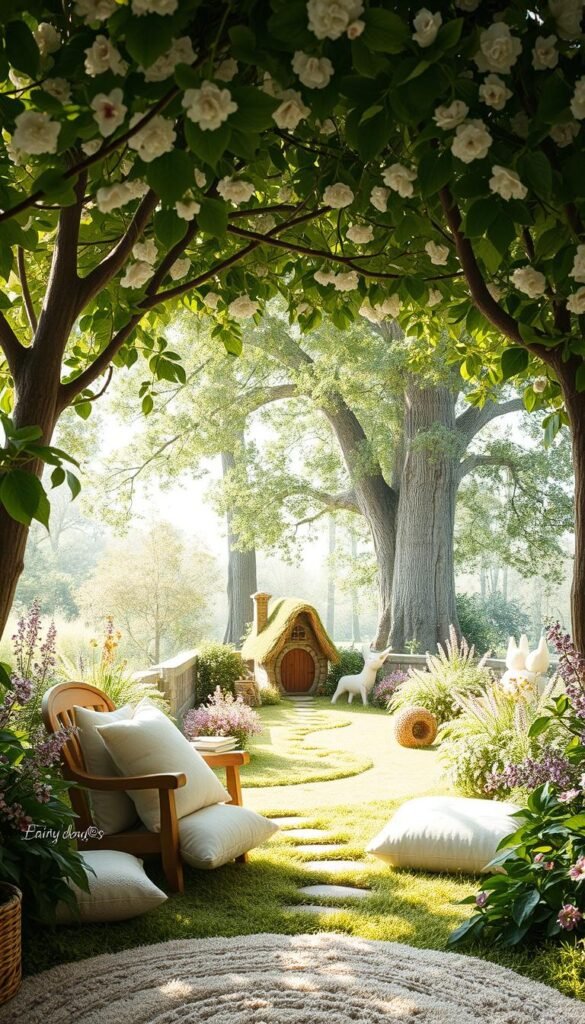Transforming your child’s special area into a haven of creativity starts with blending playful elements and organic textures. Picture soft moss-green accents paired with twinkling string lights, creating a soothing atmosphere perfect for bedtime stories and daytime adventures alike.
This approach to room design does more than delight the senses – it nurtures curiosity about the world. By integrating natural materials like wooden toys or leaf-shaped decor, you create opportunities to discuss seasons, plants, and wildlife. These interactions mirror the hands-on learning found in engaging preschool gardening activities, adapted perfectly for early childhood spaces.
The beauty of this concept lies in its adaptability. Start with a simple canopy draped with floral fabric, then add mushroom-shaped stools as your little one grows. This flexibility ensures the theme evolves alongside developing interests, maintaining its charm through toddler years.
Thoughtful details make all the difference. Consider adding a miniature terrarium to spark conversations about ecosystems, or use wall decals of friendly creatures to encourage storytelling. Every element works together to create a space that feels both magical and grounded in nature’s wonders.
Enchant Your Nursery with Magical Wall Art

The right artwork turns any room into a storybook setting. Start by selecting a focal point that captures the essence of magic – think glowing characters dancing under starlight or gentle guardians nestled among blossoms. These pieces become the heart of your design, setting the stage for layered decor elements.
Selecting Dreamy Art Pieces
Look for artwork with subtle details that spark curiosity. Delicate brushstrokes of shimmering gold or soft lavender skies create depth while maintaining a calming vibe. Opt for scenes that invite storytelling, like a tiny figure offering flowers to a firefly or a moonlit owl perched on a branch.
Mix framed prints with dimensional elements like floating shelves displaying miniature treasures. This approach adds tactile interest while keeping the wall from feeling flat. Explore creative nursery wall decor ideas that blend functionality with fantasy.
Building Depth Through Texture
Layer gauzy fabrics near your chosen artwork to create movement. A sheer canopy draped beside a starry scene mimics drifting clouds. Pair plush rugs in cream or teal with wall pieces featuring similar hues to tie the look together.
Twinkling lights woven through nearby shelves cast gentle shadows across the art, making scenes appear alive at bedtime. Remember – the goal is to create a space where every glance reveals new details, encouraging endless imaginative play.
Fairy Garden Nursery Inspiration: Bringing Nature to Young Children’s Rooms Ideas
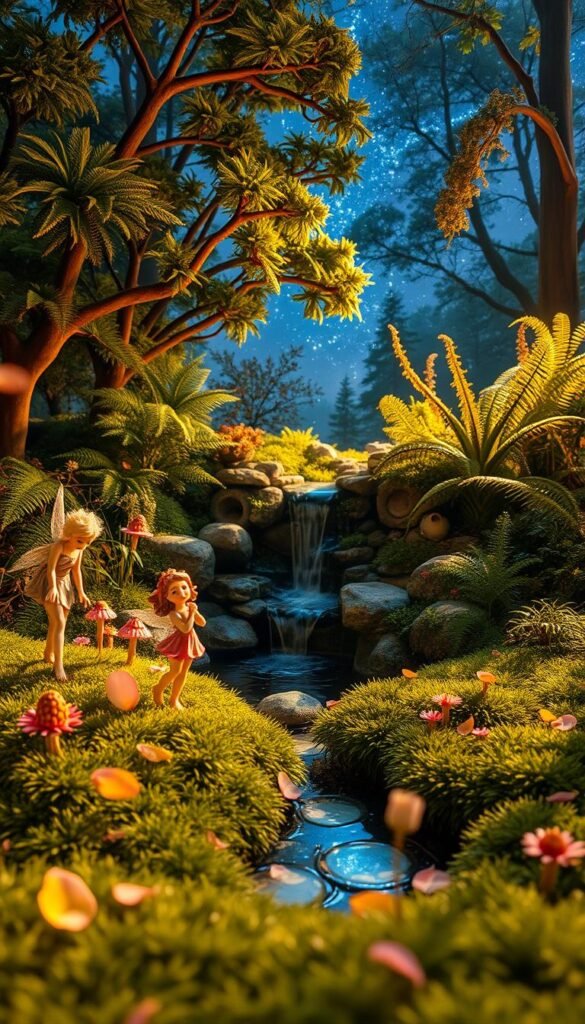
Transform any area into a wonderland by choosing art pieces that blend storytelling with visual charm. Three standout examples offer distinct approaches to sparking curiosity while maintaining a calming environment.
Art That Tells a Story
The “Fairy Light” piece features a glowing figure illuminating an open book – perfect for encouraging literacy. Soft pinks and mint greens create a soothing backdrop, while hidden butterflies in the design invite discovery during playtime.
“Glow Tale” takes this further with a towering storybook scene. Tiny creatures gather around the pages, offering daily opportunities to invent new adventures. Pair it with mushroom-shaped seating to reinforce the theme.
| Artwork | Key Features | Color Palette |
|---|---|---|
| Fairy Light | Glowing wand, open book | Rose gold, sage |
| Glow Tale | Oversized pages, fireflies | Lavender, cream |
| Bloom Fairy | Luminous flowers, vines | Peach, moss green |
The “Bloom Fairy” concept celebrates growth through delicate floral interactions. Its shimmering petals and climbing vines make it ideal for spaces near windows or plant shelves.
Complete the look with textured elements like woven baskets shaped like nests or mobiles featuring woodland animals. These additions create layers of interest while keeping the design cohesive and engaging.
Create a Whimsical Alcove for Storytime and Relaxation
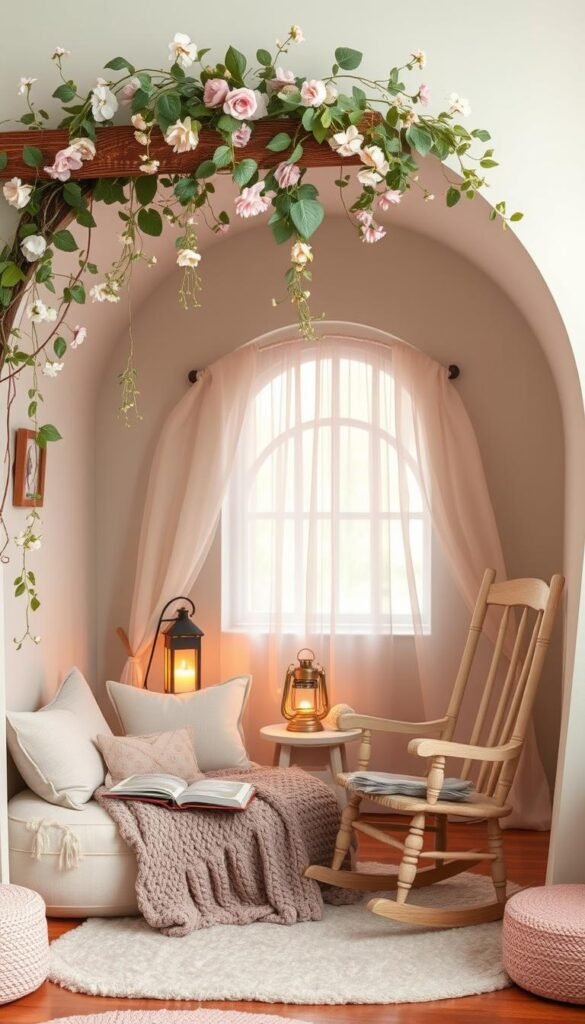
Bay windows offer hidden potential to craft cozy retreats that serve multiple purposes. Designers like Julie Laux of J. Jordan Homes demonstrate how strategic placement can maximize both style and function. In House Beautiful’s 2023 Whole Home project, she positioned the crib within a bay window to highlight the room’s architecture while creating a serene sleep zone.
Utilizing Bay Windows and Cozy Nooks
Turn underused spaces into inviting corners with plush seating and layered textiles. A cushioned bench topped with cloud-like pillows transforms into a reading spot by day. Add removable side tables shaped like toadstools for snack time or craft storage.
Balance daylight and darkness with dual-layer window treatments. Sheer curtains in blush tones filter natural light gently, while blackout shades behind them ensure uninterrupted naps. This setup lets you adjust brightness levels for playtime or bedtime routines.
| Alcove Type | Key Features | Best Use |
|---|---|---|
| Bay Window Nook | Built-in seating, storage drawers | Story sessions |
| Crib Zone | Blackout shades, canopy | Sleep area |
| Play Corner | Low shelves, soft rug | Imaginative play |
Complete your space with twinkling LED strands along the window frame. These create a starry effect at night without generating heat. Keep favorite board books in woven baskets nearby for spontaneous reading moments.
Remember to leave ample floor space for growth. As your child develops, the area can evolve from tummy-time spot to craft station. Flexible designs ensure your nursery remains functional through different stages.
Embrace Natural Elements and Sustainable Materials
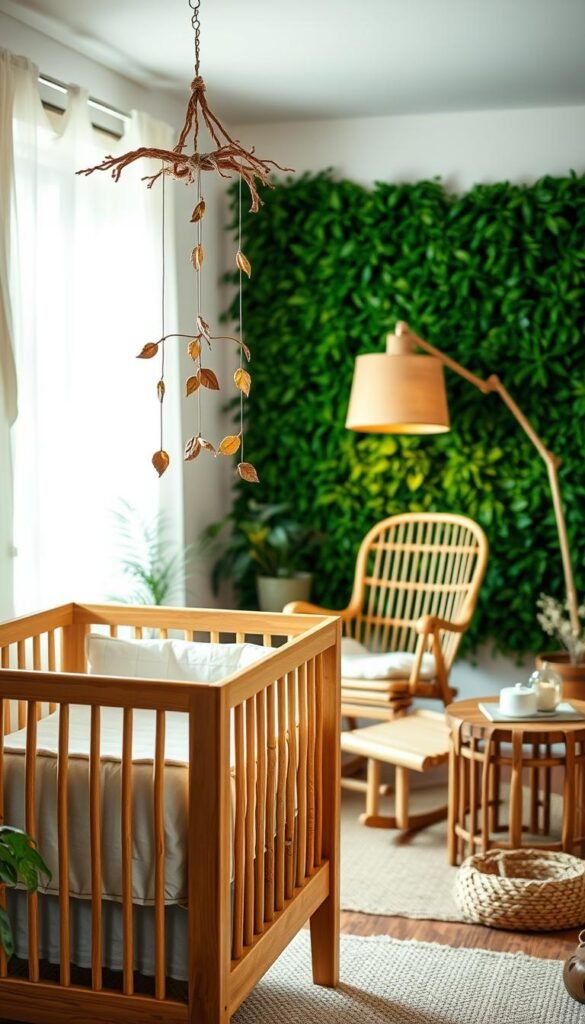
Creating a nurturing environment begins with thoughtful material choices that benefit both your little one and the planet. Opt for furniture and decor that harmonize with earthy themes while prioritizing safety and durability.
Selecting Eco-Friendly Furniture and Decor
Start with natural wood pieces from brands like Nurture&, known for non-toxic finishes and sustainable forestry practices. Bamboo cribs and rattan storage baskets add warmth while reducing environmental impact. These materials age beautifully, developing character marks that tell your family’s story.
| Material | Benefits | Best For |
|---|---|---|
| Recycled Wood | Reduces waste, unique grain patterns | Cribs, shelves |
| Bamboo | Fast-growing, antimicrobial | Changing tables, toys |
| Seagrass | Biodegradable, lightweight | Storage bins, mobiles |
Look for certifications like FSC or Greenguard when choosing furniture. These ensure low chemical emissions and responsible sourcing. Pair wooden elements with organic cotton curtains or linen cushions to complete the gardening aesthetic without compromising comfort.
Durable designs grow with your child – a convertible crib becomes a toddler bed, while storage benches double as seating. This approach reduces consumption and creates heirloom-quality pieces that future generations will cherish.
Set the Mood with Playful Lighting and Accents
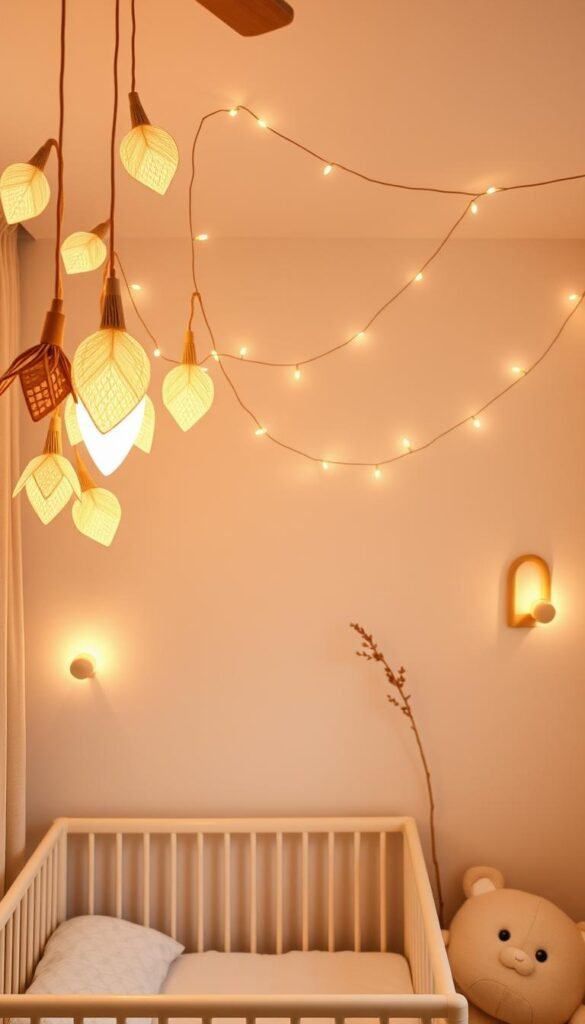
Lighting transforms ordinary spaces into enchanting environments that adapt to your child’s needs. The right combination of illumination sources creates a versatile atmosphere for both active play and peaceful rest.
Incorporating Twinkling Fairy Lights and Dimmable Options
String delicate LED strands around bookshelves or drape them along curtain rods to mimic firefly glow. These tiny lights add sparkle without overwhelming the space. Choose battery-operated options with timers for hassle-free operation.
Layer your nursery lighting with three key elements:
| Light Type | Purpose | Ideal Placement |
|---|---|---|
| Overhead | General illumination | Ceiling fixtures |
| Task | Focused activities | Reading nooks |
| Accent | Visual interest | Art displays |
Install dimmer switches to adjust brightness throughout the day. Morning natural light pairs well with 50% dimmed overhead fixtures, while evening feedings benefit from 25% glow. This gradual shift helps regulate your baby’s circadian rhythm.
Energy-efficient options like CFL bulbs reduce heat output in enclosed spaces. Try weaving fairy lights through woven wall baskets or tucking them behind floating shelves. These creative touches maintain warmth while keeping cords safely out of reach.
Add a Burst of Color with Artistic and Nature-Inspired Palettes
Color choices shape both mood and imagination in your little one’s space. Blend dreamy tones with grounding earth elements to craft a palette that feels both lively and restful.
Mixing Soft Pastels with Earthy Tones
Pair misty lavender walls with warm terracotta accents for balance. Try a base of creamy beige on furniture, then add pops of seafoam green in throw pillows or rug patterns. This approach lets you experiment with hues while maintaining cohesion.
Designer Katie Hodges demonstrates how freeform botanical murals can anchor a room. Her signature style blends hand-painted ivy vines with neutral upholstery, proving bold artwork doesn’t overwhelm when balanced properly.
Using Murals and Decals for Visual Interest
Transform blank walls into enchanted landscapes with peel-and-stick options. A sunset-themed decal behind the crib adds warmth, while removable mushroom motifs near play areas spark creativity. These temporary solutions let you refresh the color story as tastes change.
| Wall Treatment | Best For | Maintenance |
|---|---|---|
| Full Murals | Feature walls | Professional install |
| Decal Clusters | Accent areas | DIY application |
| Painted Shapes | Custom designs | Touch-ups needed |
Consider colors that adapt to different lighting. Morning sun enhances buttery yellows, while evening lamps make sage greens appear deeper. Rotate seasonal accents – golden autumn leaves in September, blooming cherry blossoms in April – to keep the space feeling fresh.
Curate a Child-Friendly Layout with Safety in Mind
Designing a safe and functional nursery starts with smart furniture placement. Focus on creating open pathways between key pieces like the crib and dresser – you’ll appreciate this during midnight diaper changes or soothing sessions. The Milan 3-in-1 Crib exemplifies smart design, transforming from bassinet to toddler bed while meeting strict JPMA safety standards.
Arranging Furniture for Easy Movement and Accessibility
Position your baby’s sleep area away from windows and dangling cords. The Aspen Dresser with rounded corners works double duty when paired with a changing topper – a space-saving solution that keeps essentials within arm’s reach. Leave 36 inches of clearance around all furniture for stroller navigation and playtime mobility.
| Furniture Piece | Safety Feature | Space Benefit |
|---|---|---|
| Milan Crib | Rounded edges, no toxic finishes | Grows with child |
| Aspen Dresser | Anti-tip hardware | Multi-functional surface |
| Storage Ottoman | Soft-close hinges | Hidden organization |
Convertible pieces adapt as your child grows – lower shelves for toddler access, higher ones for hazardous items. Anchor tall furniture to walls using safety straps, and opt for cordless window treatments. These choices maintain the room’s magical vibe while prioritizing protection.
Create distinct zones within the nursery using rugs or lighting. A plush play mat near low shelves encourages independence, while a dimmable lamp by the rocking chair supports nighttime feedings. Smart layouts blend practicality with wonder, letting imagination flourish safely.
Integrate Storytelling Elements into Your Design
Humans have shared stories for thousands of years, shaping how we connect with our surroundings. Your little one’s space becomes a canvas for imagination when you weave narrative-driven details into the design. Start by selecting pieces that invite curiosity – perhaps a mural of woodland creatures gathering under a crescent moon or framed scenes of tiny adventurers exploring mossy landscapes.
Displaying Artwork That Inspires Tales of Wonder
Choose artwork with layered details that reveal new elements over time. A piece showing dandelion seeds floating toward starry skies encourages making wishes together. Incorporate textures like rough-hewn wood frames or tactile wall hangings made from upcycled fabrics, mirroring the eco-friendly charm of handmade garden crafts.
Rotate seasonal accents to keep the theme fresh – autumn leaves in September, blooming branches in spring. Pair these with soft lighting to cast enchanting shadows during bedtime tales. For cohesive ideas, explore how mythical themes balance whimsy with timeless appeal.
Remember: the best designs grow with your child. A toadstool-shaped shelf holding board books today might display science kits tomorrow. By blending folklore motifs with adaptable elements, you create a space where every corner sparks new adventures.

